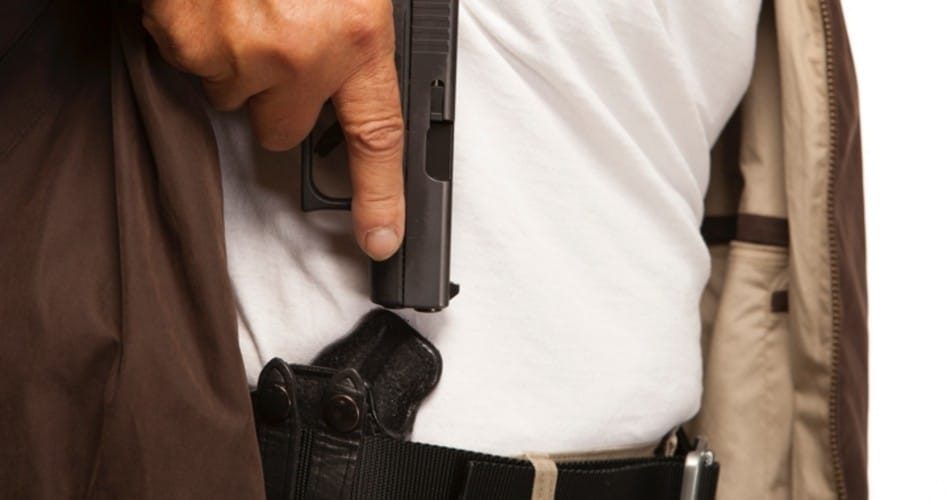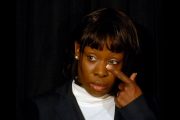
They may be full of heavenly thoughts, but no one can say they’re of no worldly good. Troubled by recent years’ mass shootings at houses of worship, some churches are resorting to more than prayer as remedy: They’re arming congregants and hiring professionals to train them in the weaponry’s use. As the Associated Press reports:
Acrid gun smoke clouded the sunny entrance of a Texas church on a recent Sunday.
Seven men wearing heavy vests and carrying pistols loaded with blanks ran toward the sound of the shots, stopping at the end of a long hallway. As one peeked into the foyer, the “bad guy” raised the muzzle of an AR-15, took aim and squeezed the trigger.
The simulated gunfight at the church in Haslet was part of a niche industry that trains civilians to protect their churches using the techniques and equipment of law enforcement. Rather than a bullet, the rifle fired a laser that hit Stephen Hatherley’s vest — triggering an electric shock the 60-year-old Navy veteran later described as a “tingle.”
The shootings this month killed more than 30 people at an El Paso Walmart and Dayton, Ohio entertainment district. But gunmen have also targeted houses of worships in recent years, including a church in rural Sutherland Springs, Texas, where more than two dozen people were shot dead in 2017.
The anxiety of one mass shooting after another has led some churches to start training and arming their worshippers with guns….
“Ten years ago, this industry was not a thing,” said David Riggall, a Texas police officer whose company [Sheepdog Defense Group] trains churchgoers to volunteer as security guards. “I mean, sanctuary means a safe place.”
While the Haslet church, Fellowship of the Parks, is still in the minority in arming up — and while one’s chances of dying in a mass shooting are slight — houses of worship are perhaps more imperiled than most places. As Al.com informed in 2017, “More than 91 people have been killed in at least 22 church-related shootings since 1999, with at least 8 shooters then killing themselves also, for a total of 99 dead.”
Houses of worship are sometimes targeted in particular because, first, a shooting at such a place has great emotional impact. Second, it will appeal to miscreants aiming to strike a blow against the group the institution is associated with (Christians, Jews, etc.); related to this, churches in many parts of the world, such as Nigeria, are prime targets of Muslim jihadists. Third, a house of worship is a soft target.
Of course, many will complain that we shouldn’t have to arm up and harden up our churches, schools, and other places where we would hope we could be safe. Yet the world has always been a dangerous place (and, historically speaking, ours is actually a relatively safe period), and we have to be realistic: Mass shooters tend to target “gun-free zones.” Outside of a Terminator movie, you don’t see lone bad guys attacking police stations.
In fact, this is true even of the insane, a category into which many mass murderers fall. (Often ignored is that even crazy people perceive and accept reality within certain contexts; after all, not too many of them jump off buildings oblivious to the law of gravity’s personal applicability.)
Then there are those who believe, and such people are often in urban areas, that firearms are inappropriate in houses of worship. But why? Pacifism may be embraced by the Amish (whose doctrine I call “a beautiful heresy”), but traditional Christian doctrine has always recognized the concept of “just war.” Ecclesiastes 3:8 tells us that there is a “time to love, and a time to hate; a time of war, and a time of peace”; Catholic saints have used guns; and even “Turn the other cheek” is not, as is supposed, a prescription for passivity in evil’s face, but is said to describe a clever type of defiance. In fact, had it not been for armed and ready Christians — during the Crusades, for instance, which sought to ward off Muslim aggression — Western civilization might not exist today.
Philosopher G.K. Chesterton, who once noted that thanks “are the highest form of thought,” also pointed out that he says grace not just over meals but also before he dips “the quill into the ink.” Guns are gifts, too. And maybe, instead of being fearful of firearms, weapons-shy theists should recognize that they’re tools and say over them a prayer: that, like their hands, these gifts should be used only for good, not evil.



